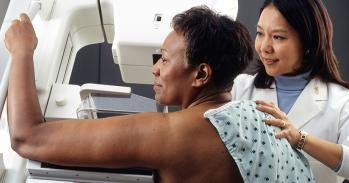
Newspaper reports suggest that France may be considering health warnings – or even an outright ban – on breast implants, following a cancer scare. Should women be concerned? Dr Suzanne Turner from the Department of Pathology, University of Cambridge, looks at the truth behind the headlines.
Newspaper reports suggest that France may be considering health warnings – or even an outright ban – on breast implants, following a cancer scare. Should women be concerned? Dr Suzanne Turner from the Department of Pathology, University of Cambridge, looks at the truth behind the headlines.
It’s becoming clear that having breast implants is not itself without risk, but the associated cancer risk is still extremely small
Suzanne Turner
“Breast implants to carry cancer warning” read the headline of an article on the MailOnline website today. This follows the outcome of a study by the French National Cancer Institute, which reported that there was “clearly a link” between breast implants and anaplastic large cell lymphoma, a relatively rare form of cancer of the immune system that usually affects children and young adults independently of breast implants.
This is the not the first health scare to surround breast implants in France: remember the “exploding” Poly Implant Prosthese (PIP) breast implants widely reported in 2010, which led to the company that manufacture them being closed down?
So, should women who have received a breast implant be concerned and should they consider having them removed?
I run an active research group at the Department of Pathology, University of Cambridge. Last year, I co-led an independent study, funded by Leukaemia and Lymphoma Research, looking at the risks to women with breast implants of developing implant-associated anaplastic large cell lymphoma (iALCL). Our study, which was published last year in the scientific journal Mutation Research Reviews, was part of the evidence considered by the French National Cancer Institute when preparing its report.
In our study, we found 71 cases of iALCL worldwide: this means it is an extremely rare occurrence – for every three million breast implant procedures, we estimated that between one and six women would develop iALCL.
The French study, which considered cases of iALCL diagnosed in France since 2011, found that of approximately 400,000 women with breast implants in France, 18 had been diagnosed with iALCL. This rate is clearly significantly higher than that found by our study – the reason why is not clear, though it may be due in part to better screening. The French National Cancer Institute suggests that this increasing incidence confirms a strong link between breast implants and cancer – as a consequence, some newspaper reports have suggested that the French government may even consider a ban on this cosmetic procedure in France.
Whether such drastic action is required will depend on future monitoring of these patients; of the 49 cases reported in our study where information on the patients’ progress was available, there were only five reported deaths. While some patients received chemotherapy and radiotherapy, for many women their lymphoma was put into remission simply through removal of the breast implant and surrounding tissue. This suggests that it is the body’s abnormal immune response to the implant that is causing the cancer. Chemotherapy did not appear to significantly increase a patient’s chances of survival.
So far, the incidence of iALCL has not been associated with any specific form of breast implant and there have been no links with the PIP prostheses, even though the first woman reported to die from this lymphoma in France was a carrier of a PIP implant.
On Tuesday, the French Minister of Social Affairs, Health and Women’s Rights, Marisol Touraine, called a press conference at which she sought to calm fears about the risks. According to the Mail, she said: “We do not recommend that women carrying these implants have them removed.” Instead, it has recommended that women remain vigilant for symptoms of iALCL, which include swelling of the breast sometimes associated with pain and ulceration and a general impaired condition around the breast containing the implant. If any of these symptoms are recognised, they should consult their GP for advice.
There are many reasons why women choose to have a breast implant. It’s not all about vanity, a desire for larger breasts, as unfairly characterised by much of the media. It can be about corrective surgery following breast cancer removal, increasing one’s self-image and confidence or correcting uneven breasts, for example.
I would like to see the UK establish a cancer registry to record and follow-up on all cases of iALCL in the future. There are still many unanswered questions and only by getting to the bottom of this very rare disease will we be able to find alternative ways to treat it. It’s becoming clear that having implants is not itself without risk, but the associated cancer risk is still extremely small. In the meantime, we need a measured debate: alarmist headlines do not help, but only serve to cause unnecessary anxiety.
The text in this work is licensed under a Creative Commons Licence. If you use this content on your site please link back to this page. For image rights, please see the credits associated with each individual image.





